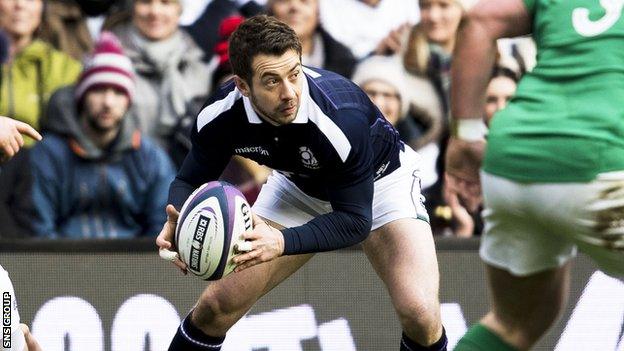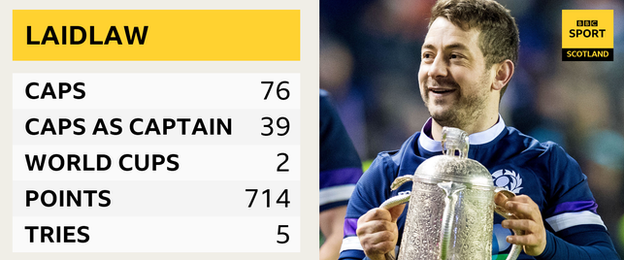Greig Laidlaw: Scotland scrum-half was undervalued but repeatedly instrumental
- Published

Greig Laidlaw is Scotland's second highest points scorer and has captained the side more than any other player
First John Barclay, then Tommy Seymour and now Greig Laidlaw. The conveyor belt of Scotland retirements continues to whir. That's three players with a combined total of 207 caps all announcing their departure from the international stage in the space of a few weeks.
Laidlaw's decision was expected. In the spring, Gregor Townsend had hinted that his scrum-half was thinking of calling it a day after the World Cup with Laidlaw, himself, more or less confirming it before a ball had been kicked in anger in Japan. He's 34. Now is as good a time as any to bow out. Let the younger guys get on with it. Laidlaw has done his bit.
He won 76 caps. He wasn't just an international rugby player, he was a rugby encyclopaedia. His knowledge and love of the game was vast. Laidlaw had to endure plenty of stick along the way but he was never letting anybody get in the way of his dream. The beginning, the end and the in between of that dream was playing for Scotland. He lived it for nine years.
Scotland saved by captain time and again
Many of those years were tough. For chunks of his time in the Scotland team there was debate around him. He offered intelligence, leadership, mental strength and phenomenal goal-kicking. He didn't offer pace and unpredictability and line-breaking threat, the very qualities that Scotland needed if they wanted to make good on their recent desire to play a superfast brand of rugby.
For years it seemed like Scotland had been trying to wean itself off Laidlaw in favour of a running scrum-half. Approaching the 2015 World Cup, Sam Hidalgo-Clyne, then of Edinburgh, was the flavour of the time, a dynamic nine with a bit of everything in his game. For a little spell, a campaign built up around him becoming Scotland's first-choice.
Come the World Cup, Laidlaw swatted aside all challengers. In the pivotal group game, against Samoa, Scotland were in a giant hole and needed Laidlaw to dig them out of it, which he did, not just in scoring a critical try, but by landing three conversions and five penalties. He ended with a 26-point haul in a game that Scotland won by three points.
The following summer, Scotland were in another hole in the second Test in Japan only for Laidlaw to come off the bench and win the game with his nous and his boot.
Injury wiped out a good portion of his 2017 Six Nations season - he steered Scotland to victory over Ireland before being invalided out of the championship during the next game against France - and by the time he returned to fitness things had supposedly moved on.
Ali Price had come into the team and had proven a revelation in victory over Wales, over Australia in Sydney in the summer (Laidlaw had recovered and was with the Lions in New Zealand at the time) and over Australia again in Edinburgh in the autumn. Price also started against the All Blacks, a game that Scotland came close to winning. We were entering 2018. Price was tearing it up. He was the man.
When Scotland went down in flames in Cardiff in the opening game of the 2018 Six Nations, Laidlaw was sent for. His leadership was required. Sure, he might not have been able to bring the same kind of flamboyance that Price had on his best days but he had authority and resilience and that's what Scotland needed in a crisis.
Laidlaw was instrumental in the victories over France and England that followed. Others might have captured the headlines from that Calcutta Cup win - Finn Russell, Huw Jones to name just two - but Laidlaw's control underpinned the whole thing. He didn't get the credit he deserved, but he was outstanding.

'He earned his peers' respect a long time ago'
The final game of that 2018 Six Nations was against Italy in Rome. Scotland were on a roll and were expected to win with a little to spare. The game became an almighty grind and had it not been for Laidlaw it would probably have been lost.
Having started at scrum-half, he had to switch to fly-half for the final 26 minutes. He gave one try-scoring pass to Sean Maitland, gave another to Stuart Hogg and then landed a 79th-minute kick that gave Scotland a two-point win. Despite the pressure, you never thought for a second that he was going to do anything other than bang it over the bar.
"The criticism doesn't bother me," he said, before heading to Japan in the autumn. "It doesn't. I believe in myself and it doesn't matter if somebody writes something down on a sheet of paper slagging me off. It's water off a duck's back. I don't read it."
Laidlaw's passion was unmissable. Over the years there have been stories of Scotland players who have been slightly reluctant to speak their minds when things were going wrong for fear of upsetting people. Laidlaw wasn't one of those. He was brave on the pitch and brave off it. If something needed to be said, he said it.
In recent times, he's heard plenty of folk telling him what he isn't instead of recognising him for what he is. Or was. In the Test arena, Laidlaw was undervalued by many outside the Scotland bubble while being appreciated massively by those who played with him and who understood what he brought to the table for close to a decade.
In the end, you sense that all he was looking for was not headlines but the respect of his peers. He earned that a long time ago.
Chris Patterson pays tribute to Greig Laidlaw after his retirement was announced.
